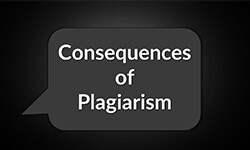
The consequences of plagiarism vary in scope and severity, but ultimately it is an illegal practice that undermines the integrity and credibility of the research.
In this article, we shall discuss the consequences of plagiarism at length and why it is bad for academic research.
Definition: Consequences of Plagiarism
The consequences of plagiarism are the direct or indirect outcomes of engaging in plagiarism. As stated earlier, the consequences of plagiarism vary in severity, and we can divide these consequences into mild, moderate, and severe categories as follows:
| Plagiarism Level | Examples | Probable Consequence |
| Mild | • Failing to cite a source present in the text on the reference page. • Excluding quotation marks from a direct quote. |
Zero score or grade penalty |
| Moderate | • Text from an external source with a few alterations made. • Paraphrasing primary or secondary sources and omitting citations. |
Fail grade on the course |
| Severe | • Parts of other texts presented as original work. • Research papers that belong to other authors. |
Academic suspension or expulsion |
Outside academic writing, the consequences of plagiarism in the college application process may include the dismissal of your application. Many college applicants who present essays may be unaware that schools use plagiarism checkers, which may lead to various consequences of plagiarism if plagiarized content is detected.
Consequences of plagiarism– Testimonies of colleges
There are severe consequences of plagiarism in college because these institutions are vested in protecting their reputation and credibility as thought leaders in their fields. Both deliberate and unintentional plagiarism can attract penalties, and it is crucial to cross-examine your college presentations to avoid the consequences of plagiarism.
Colleges often have a clear plagiarism policy.
Why are there consequences of plagiarism
Plagiarism is considered a serious offense in universities and other research organizations because it is a form of fraud and equals theft, even when committed unintentionally. The consequences of plagiarism are severe because:
✘ Plagiarism is dishonest. Committing plagiarism shows that a researcher is dishonest about their involvement in the work they present.
✘ Plagiarism is an offense to the owner of the work – Using someone else’s work without acknowledging them is stealing their work.
✘ It derails the learning process – When you fail to do your research, analyze your findings, and present your work with supporting evidence, you are not learning. It is the duty of every researcher to voice their own informed opinion for learning to be an ongoing process.
✘ It blurs the origin of ideas – Rules of citation in academic writing are in place to give credit to the sources of ideas. Plagiarism obscures the origin of ideas and makes it difficult for your readers to find the original sources to conduct further research or identify gaps in your work.
✘ It results in poor quality work – The flow of thought from original ideas is inhibited by plagiarism. Plagiarized work is often a mixture of information from different sources that lacks coherency and fails in its mandate to convey clear arguments.
FAQs
Plagiarism is illegal. It is a type of theft and is categorized as a serious irregularity as it constitutes theft and often leads to low-quality research.
Yes, it can. You may cite a source and forget to include it in the reference list. This type of plagiarism attracts mild consequences.
Plagiarism is considered a severe violation in academic writing. This is because it hampers learning growth and fails to acknowledge the original author of the plagiarized content.
Sometimes students may recycle work that they have presented for evaluation before. This is known as self-plagiarism and is classified as an academic offense since no new ideas are presented.
